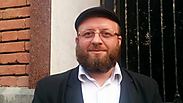
Georgian Jews: We'll come to Israel 'only when the Messiah arrives'
Tbilisi's Jewish community lives in rare coexistence with its Christian neighbors, strictly distinguishes itself from other communities in former Soviet countries and is showing no desire to make aliyah.
On our way there, we pass by a local pub, where a pair of guitarists are playing "Jerusalem of Gold." Noticing our interest, one of them tells us with a wide smile that the building in which the pub is located today used to serve as one of Tbilisi's synagogues and is evidence of a huge community which, according to the locals, numbered as many as 250,000 people.
Built in 1904, the community's magnificent synagogue and its two prayer halls are decorated with classic Art Nouveau drawings. The prayer halls combine magic reserved for synagogues from the East, with the velvet sears and the heavily decorated curtain covering the front of the Holy Ark, in a classic Western building featuring original Eastern European wooden floor.
Click here to see the magnificent synagogue.
In the women's gallery, one can still find books of the Pentateuch from the early 20th century, which still serve the female worshippers. The magic continues in the rooms of the rabbi and synagogue affairs managers, and in the oil paintings adorning the walls.
They won't talk easily. Adult and silent men, members of the community, sit on the benches outside the synagogue between the afternoon and evening prayer. Life under Soviet rule has left its mark on them. Foreign men (or women) asking questions, even in Hebrew, are not necessarily welcome.
'There is no anti-Semitism here'
In the end, they agree to send me to the rabbi and promise, in surprisingly fluent Hebrew, that he will answer all my questions. The rabbi, 36-year-old Rahamim Mordechaishvili, grew up here but received his Torah education in Israel. In Jerusalem, to be exact.

"There has always been a glorious Jewish tradition here," he says, pointing to the "wall of sages" at the entrance to the synagogue, which includes photos of the community's greatest scholars throughout the generations.
"Even during Soviet rule, Judaism continued to thrive in Georgia. We had a matzah bakery, a ritual bath and a Jewish slaughterer. There were great rabbis here. Sometimes they would receive questions from the Land of Israel. Some of them, by the way, came from the Land of Israel."
Rabbi Mordechaishvili describes a small community, protective of its identity and independence, which prefers to distinguish itself from other Jewish communities in the former Soviet Union. The assimilation rate in the country - a phenomenon of the past few years - is meager.
Despite Georgia being a devout Christian country, the Jewish community members live in rare coexistence with their neighbors. "There has never been anti-Semitism here," the rabbi says. "There is no anti-Semitism today either. One can walk around with a skullcap and a fringed garment. Jews and Georgians have always had good relations."
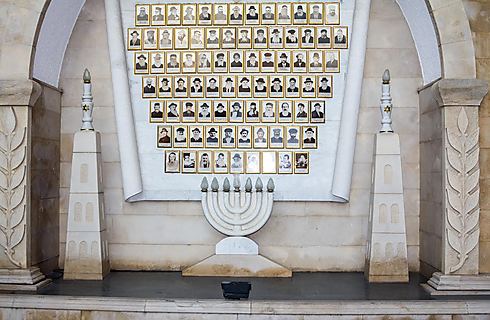
But from the glorious era of thousands of Jews, and a district filled with synagogues, the Georgian Jewry shrunk significantly. Today there are only 4,000 to 5,000 Jews in the entire country, most of them in the capital. Most members of the community found themselves in Israel, while others chose to remain in Eastern Europe and immigrated to Moscow. Others reached North America.
Do you encourage the Jews to immigrate to Israel?
"Yes, absolutely. Both the young and the old."
Two Jewish schools
The country, which became more Christian and more pro-Israel upon the Soviet Union's collapse, is coming alive. Not only tourists arrive here, but also young Israelis of Georgian descent who are looking for business opportunities in a country which has declared war on bureaucracy.
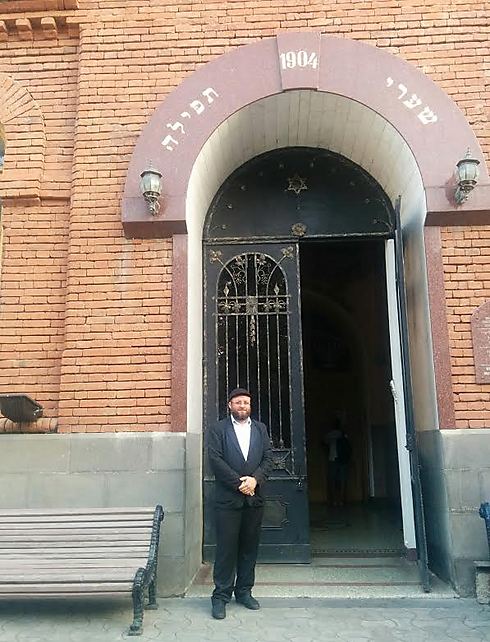
Georgia has become a suitable (and cheap) alternative for boycotted Turkey, and in the tourism season which just ended Hebrew could be heard everywhere. During a visit to the Zionist Seminary camp in Georgia, I met a unique and fascinating community.
"There are many business options here. The governments and ministers are all good to the Jews, there is no religious hatred, and people only help each other. That's why the community will survive. It's possible that the Messiah will arrive tomorrow and we'll all come to Jerusalem, but until then, we're here."
Tbilisi has another synagogue which belongs to the Chabad movement, and an Ashkenazi synagogue where, according to the rabbi, members of the Ashkenazi minority which arrived in the country used to pray.
The local Jews also have to Jewish schools which combine Torah studies with general studies. One belongs to the Jewish community and the other to Chabad. When I try to understand why such a small community needs two schools, the rabbi explains diplomatically: "Each person and his own approach."
Between West and East
The community's ethnic identity is one of the key points distinguishing it from other Jewish communities in Eastern Europe.
"We pray in the Sephardic style," Rabbi Mordechaishvili says. "Not Chabad and not Ashkenazi style," he stresses, adding that Ashkenazi rabbis who arrived in Georgia in the past following wars and expulsions created a conflict with the local community.
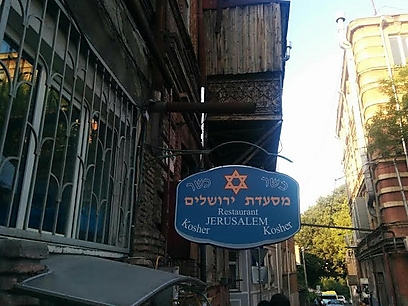
"They brought many Ashkenazi customs and rules here, although almost all Jews here were Sephardic. The Ashkenazi rabbis were angry, for example, when they saw them eating rice on Passover."
Shlomo Neeman, the founder of the Zionist Seminary and a senior advisor to the immigrant absorption minister, points to the "Jewish gaps" between Ashkenazim and Sephardim in former Soviet countries, which years of Communist rule have failed to eradicate.
"In Georgia," he says, "the Jews are deeply rooted. They want kosher slaughter, they want a mikveh, they want to maintain a Jewish identity. They always had all of that here, even in the darkest years of the Soviet era. Precisely because of that, they see the organized Judaism of the Soviet Union as a sort of patronage.
"The Sephardim come from areas which want to disconnect from Russia, and the Ashkenazi ones are mostly connect to the 'Great Russia,' whether they like it or not. In other words, it's an matter of local politics as well.
"The Ashkenazim are not as rooted in terms of Jewish identity either. The absolute majority completely disconnected from their roots under the Soviet rule, especially in the religious sense. So the Sephardim here see the Ashkenazi Jewry as a heretical Jewry which can be doubted."
'Their camp' and 'our camp
"The problem of the young people," on the other hand, is shared by both Ashkenazim and Sephardim.
"Twenty years ago, if a Jewish man had married a non-Jewish woman, it would be considered a terrible thing. It would become the talk of the day between the Jews," says Rabbi Mordechaishvili. "Today the community is very small and many are leaving. Unfortunately, there is some assimilation, but it's still the minority. We try to organize events for the young ones, parties, to give them a chance to meet each other."
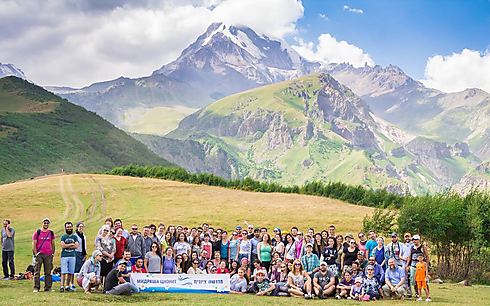
The Zionist Seminary camp for students is doing just that. The official goal was to "strengthen the Jewish identity and the connection to the State of Israel," but the camp actually served as a hot spot for meetings between young Jewish singles from Eastern Europe.
Twenty-three couples have already been formed in these summer camps, and two of them have gone on to serve as instructors for more than 100 students who arrive every years from all over the former Soviet Union.
But the only Georgian trademark can be found in the khachapuri served in the vibrant cafeteria of the camp, which is held in a resort village 60 kilometers from Tbilisi. But not a single student from the local community has signed up for the camp.
"It's not that we haven't tried," says Elisha Henkin, CEO of the Zionist Seminary. "We approached young locals and tried to arouse their interest. Unfortunately, it didn’t happen.'
A Judaism they were willing to die for
The decision to hold the camp in Georgia of all countries was not random. The ancient Jewish community, which goes back to the days of the First Temple, is deeply entwined in the local Christian tradition - till the modern era.
Why do you think it's important for Israeli tourists arriving in Georgia to know about the community?
"It's important for them to know that all the remains of Judaism they see there - every synagogue, every Torah scrolls - was the result of a lot of devotion. That these Jews they see before their eyes, who may try to sell them win for an exaggerated price, have sacrificed their lives for Judaism, knowing it could lead to their death.
"The fact that there are Georgian Jews today who are connected to Judaism and to Israel is not by chance. Someone sacrificed his life for it."











